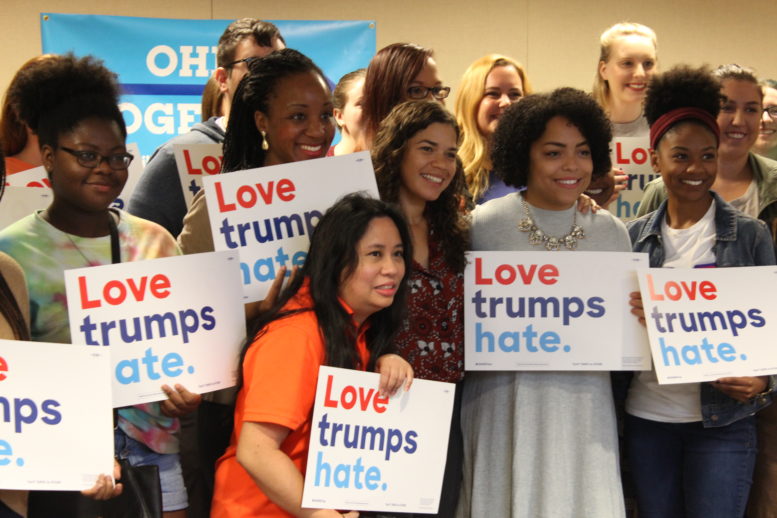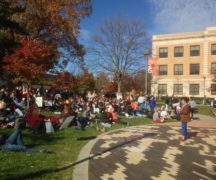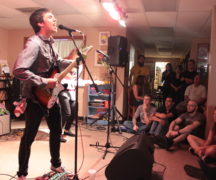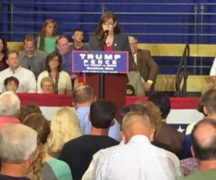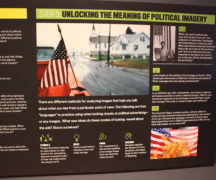By DAVID DUPONT
BG Independent News
TV and movie star America Ferrera knows what a lot of immigrant kids are going through these days.
When she was 9 and living in California’s San Fernando Valley, the state’s voters were considering Prop 187 which would have barred all undocumented immigrants from receiving any public services including education.
That was the first election she remembered. Now in the midst of another campaign with high stakes, Ferrera is touring the country to encourage people to register to vote, and then cast ballots for Hillary Clinton. She stopped by Bowling Green State University Sunday morning to give a pep talk to several dozen students preparing to go out and canvass the neighborhoods around campus.
The community Ferrera lived in was diverse. She was a first generation America. Her parents came from Honduras. “My friends were first generation all kinds of things,” she said. Their parents came from Vietnam, China, Latin American countries, and Arab countries.
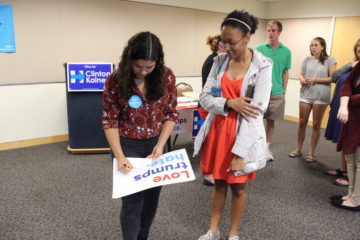
America Ferrera signs poster for BGSU student Kianarose Irving, right.
At home they ate different kinds of foods and their parents “yelled at us in different languages,” Ferrara said. “But when we went to school we were all Americans because we pledged allegiance to the flag.” They all thought of themselves as “true-blooded Americans,” and “we all deserved justice and to be treated in the same way.”
But in 1994 with Prop 187 on the ballot children were being questioned and taunted and threatened.
Ferrera hadn’t experienced any of that but her mother took her aside to warn her and tell her if anyone ever questioned her to know: “You didn’t do anything wrong. You belong here.”
For the first time in her life, Ferrera felt different from her peers.
And she knows now with the overheated anti-immigrant rhetoric coming out of the Donald Trump campaign, families are reporting the same kind of harassment.
Kids are told: “My dad says when Trump is president, he’s sending your parents away.”
Young Arab-Americans wonder: “What does a ban on Muslims mean for them and their families?”
Blacks wonder: “What does a nationwide stop and frisk mean for our lives?”
“The stakes have never been higher,” she said.
In introducing Ferrera, Kandann Coleman, the president of the Latin Student Union, which sponsored the visit, said the same thing. “Politics really do matter especially to people of color.”
Later in an interview, she said, her fellow students seem “indifferent.” The Democrats and Republicans are present, but other students tend to steer clear of them.
Students are involved in their own service efforts, and tend to focus on those rather than politics.
Having someone like Ferrera on campus helps to engage them. Ferrera is going out and meeting with average Americans, especially people of color, Coleman said. “She’s standing up and using her voice.”
Ferrera’s travels give her all the more reason to push to get people registered.
She said she sees people sick because of pollution. She sees women losing their access to affordable health care. She sees laws passed that make voting more difficult.
The next president, she said, could appoint three Supreme Court Justices. So the consequences extend beyond the four or eight years of a president’s tenure. “What this country is going to look like for the rest of our lives could be shaped by this presidential election.”
Ferrera sent the 30 or so canvassers off urging them to get all their team mates and classmates, fellow club members, co-workers and friends to vote.
If they encounter students from out of state, Ferrera said, encourage them to register here. “Ohio really, really matters.”
“It always boils down to who’s going to the polls, who’s creating political consequences for elected officials,” she said. “If we disengage, we just create a void and let someone else decide the things that matter in our lives.”

